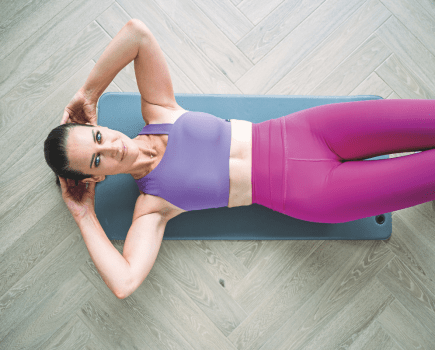Two of the main determining factors when it comes to how healthy and happy you are in your later years are mindset and outlook on life. Here’s how you can upgrade your thinking to slow the ageing process and feel young again at 40, 50, 60 and beyond…
When actress and model Christie Brinkley had her 65th birthday, she called it her ’15th 50th birthday’, instead of celebrating that actual number, in recognition of the fact she feels no older than 50.
This, she says, is her ‘spirit age’, which is nothing to do with how old she might be chronologically. And this is an idea we love, at Top Santé as thinking this way has been proven to turn back the clock and help us learn how to feel young again, whether we’ve just hit 40, 50, 60 or beyond.
Can positivity slow the ageing process?
In recent years, researchers examining the science of ageing have found that the more positive we feel about getting older, the more slowly it happens. People who think they are younger than they are have brains that look and act younger than their peers. And those with positive attitudes to getting older have better health during old age – they even live up to seven-and-a-half years longer than those with less positive beliefs
One German trial even concluded that your attitude to ageing is a bigger predictor of how healthily you age than the actual state of our health! The reason is simple; feeling bad about getting older can become a self-fulfilling prophecy.
‘There are a couple of reasons why this happens,’ explains Dr Hannah Swift, a researcher in ageing psychology at the University of Kent. ‘One of the most important is a psychological theory called “stereotype embodiment” which means if we don’t expect to be able to do things well as we get older, we simply don’t try to challenge that stereotype, which then causes our actual performance to decline.’

Your attitude to ageing is a bigger predictor of how healthily you age than the actual state of our health! The reason is simple; feeling bad about getting older can become a self-fulfilling prophecy.
44%…that’s how much more likely you are to recover from a health problem if you have a positive attitude to getting older
Conversely, the more positively you think about aging, the more control you believe you have over it. This means that if, say, you get diagnosed with arthritis or high blood pressure, you won’t just think ‘well, that’s normal at my age,’ you’ll be more likely to look for ways to help lessen the condition, such as exercise and changing your diet.
‘Those with more negative beliefs tend to have a “what’s the point” attitude and just let things take their course,’ says Dr Swift. Negative attitudes to ageing are also stressful on your system, which in itself takes its toll. Shockingly, people who had a negative idea about ageing before the age of 39 were twice as likely to have a heart attack after 60 – something researchers attributed to the stress and anxiety they feel.
What is your spirit age?
Our attitudes to ageing are set in childhood, ‘but our forties and fifties are a real flashpoint for them coming to the surface,’ says psychotherapist and self-esteem coach Alison Moore.
‘One reason for this is the approach of menopause – so many women link youth to fertility that as menopause approaches, it makes us think more about our age. We start to worry about what others think; we start to wonder whether we’re too old to wear this or do that and we start to feel we need to conform.’
Here’s where having a “spirit age” comes in handy as it helps to counteract all of this: it can help us to feel young again at 40, 50, 60 and beyond. But, how do you find your spirit age? For some, it’s easy – it’s that number that flashes unbidden into your head when someone asks how old you are. For others, you might need to ask yourself a few questions.
To work out your spirit age, you could consider: how much younger or older do you feel compared to your peers? What age do you feel inside? What age do others think you are? All of these things combined create the attitude and feeling that makeup your spirit age.
‘Your spirit age is how you’ve kicked around the world. It’s what you’ve gathered and how you move and your point of view, your enthusiasm, your gratitude, your appreciation. It’s your energy, your aura – that’s your true age. Not that other arbitrary number.’ – Model and actress, Christie Brinkley

The more positively you think about aging, the more control you believe you have over it.
How to feel young again at 40, 50, 60 and beyond
Just hit 40, 50, 60 or older and need a little help learning how to feel young again? The following tips will help you lower your ‘spirit age’ and have you feeling more vital, invigorated and rejuvenated in mind and body…
1. Stay curious and keep learning
Some people become less interested in new things around the age of 30, ‘but being inquiring and curious keeps you young,’ says Alison. ‘It keeps the inquisitive part of your brain working and keeps you relevant.’
When someone talks about Drake (a singer) or James Charles (YouTube make-up artist), and you know who they are, you a) don’t feel left out and b) younger folk don’t feel they have to leave you out either.
2. Spend time with youthful thinkers
If all your friends are starting to don ankle-length slacks and flat shoes and moan about ‘the youth of today’ you can be inclined to think the same way. ‘It’s natural for you to want to fit in with your friends so, look at who you mostly mix with and make sure they inspire your new positive attitude,’ says Alison.
3. Recognise and protect your boundaries
Sometimes, being around younger folk may do more harm than good. It’s known as ‘stereotype threat’, which Dr Swift explains as a situation where your confidence gets sapped because you feel out of place. This can unconsciously cause you to perform worse than you should.
‘In studies on brain health, people told they were going to be compared with younger people performed worse than normal,’ says Dr Swift. If you feel like this in an area of your life, improving your self-belief in the area will help, but while you work on that, stay in your comfort zone.

Trying new experiences – rather than always sticking to the same few hobbies and daily routine – can help us to feel young at heart and passionate about life again.
4. Try new experiences
Seniors who know how to feel young at heart are more open to doing new things, according to studies. Don’t fall into ruts such as eating the same foods or visiting the same places all the time.
5. Check your perceptions
‘One of the reasons we fear getting older is because of the way we perceive the elderly in general – as a bit hopeless and helpless. But ask yourself whether this is your reality?’ says Alison. ‘Chances are it’s not, so don’t reinforce it.’
6. Celebrate your birthdays
If you stop doing this, you’re telling your mind it’s something that you are ashamed of. ‘Embrace the fact you had another great year!’ says Alison. Why not start planning your next party now?
7. Pick the right role models
Finding role models that challenge beliefs about ageing also helps you learn how to feel young again at 40, 50, 60 and beyond and settle in to your spirit age. But you need the right role models. Surprisingly, Googling ‘90-year-olds running marathons’ might not actually help. ‘This type of behaviour is usually presented as extraordinary, which may actually reinforce negative stereotypes,’ says Dr Swift.
Instead, just look for people challenging negative images of ageing in less extreme ways. Think the lady still playing tennis at the local court at 74 rather than one running marathons, or Dame Helen Mirren who, although a star, is down to earth and rocking her grey hair, rather than, perhaps, Madonna, who looks no more than 40 in the June issue of Vogue but who has the means to keep herself looking that way, unlike most of us.
Most of us already have a ‘spirit age’. Studies on ageing find most people feel 15 per cent younger than they are.
Related: 5 recipes to help you age well over 40
Words: Helen Foster | Images: Shutterstock








